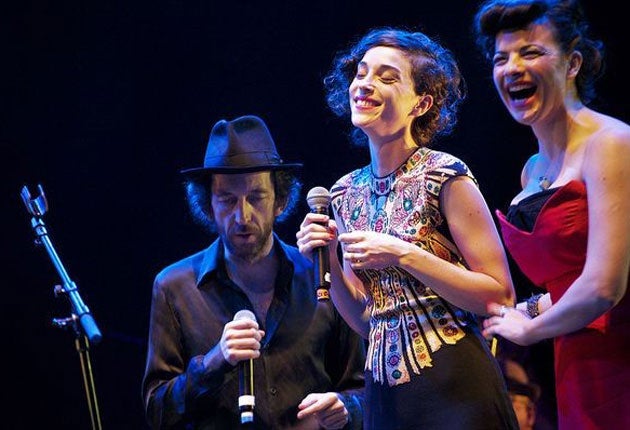Rain Dogs Revisited, Barbican, London

With his mid-Eighties masterpiece Rain Dogs, Tom Waits somehow re-routed the entire history of R&B, jazz, folk and popular song through his peculiar junkyard sensibility, American pop culture re-emerging bolted together in oddly beguiling new shapes, within whose whiskery strains lurked an engaging cast of scufflers, low-lifes and bad boys.
This timely 25th anniversary celebration is undertaken in an appropriately adventurous spirit, its internationally sourced succession of singers supported by a house band of startling range. Former Elvis Costello keyboardist Steve Nieve, for example, layers myriad textures of organ, piano and harmonium, excelling with a heartbreakingly beautiful melodica part on "Blind Love"; and Terry Edwards is a blur of energy as he switches between saxes, trumpet, flute and guitar.
But it's Thomas Bloch who dazzles most, drawing an extraordinary range of sounds from his Ondes Martenot, glass harmonica, and the bizarre reverberations of the Cristal Baschet, whose resonant rods and outsize metal cones dominate the rear of the stage. The combination of his delicate drones and David Coulter's bowed-saw whine makes the poignant setting for both Camille O'Sullivan's whispered "Hang Down Your Head" and Arthur H's wistful "Time".
Elsewhere, O'Sullivan's exuberant, madcap "Singapore" is done as a sort of benign berserker march, ending with Tom Herbert drawing wooden-ship creaks and groans from his bass as the singer sways back and forth. The Tiger Lillies bring their own absurdist cabaret manner to bear on "Rain Dogs" and "Diamonds & Gold", then mad Swiss punk-folker Erika Stucky arrives, dragging a shovel through the auditorium before keening and murmuring her way through "Jockey Full of Bourbon" and a cacophonous medley of "Union Square/Down Down Down".
The folksy Stef Kamil Carlens capers through a "Cemetery Polka" that he describes with acuity as sounding "like all your dead relatives have come to life, and you owe them money", before US chanteuse St Vincent sails through two of the album's most affecting melodies, "Downtown Train" and "Tango Till They're Sore", with Gallic singer Arthur H bringing proceedings to a close with a funky, swaying "Clap Hands" and a moving "Time". Tom Waits himself would surely struggle to equal the evening's diversity.
Join our commenting forum
Join thought-provoking conversations, follow other Independent readers and see their replies
Comments
Bookmark popover
Removed from bookmarks